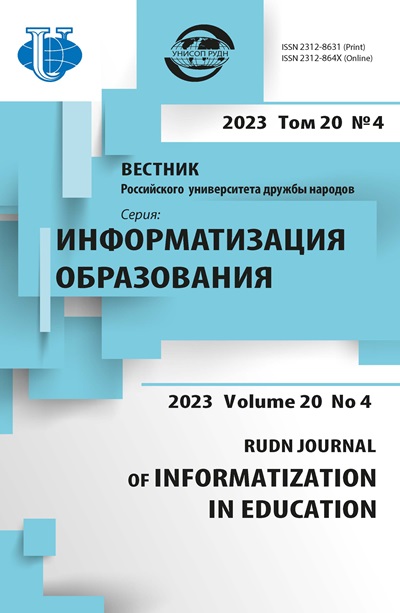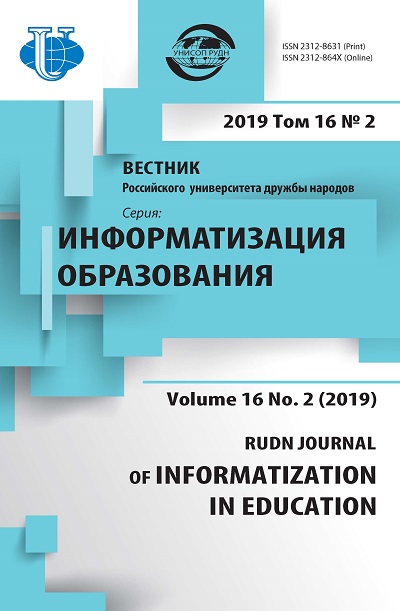Possibilities for solving the problems of social adaptation of orphants with the help of information resources
- Authors: Patrin M.A.1, Novohackaya T.A.1, Grigorev I.S.2, Revazyan G.A.3
-
Affiliations:
- Moscow City University
- Resource Center of Universal Design and Rehabilitation Technologies of the Ministry of Industry and Trade of the Russian Federation
- Department of rehabilitation Industry of the Department of Development of the Industry of Socially Significant Goods of the Ministry of Industry and Trade of the Russian Federation
- Issue: Vol 16, No 2 (2019)
- Pages: 185-193
- Section: EDUCATIONAL ELECTRONIC PUBLICATIONS AND RESOURCES
- URL: https://journals.rudn.ru/informatization-education/article/view/21650
- DOI: https://doi.org/10.22363/2312-8631-2019-16-2-185-193
Cite item
Full Text
Abstract
The problem and the goal. Informatization and computerization of society has affected almost all types of human life, including the scope of receiving and providing services. The rarity of online shopping at the beginning of the 21st century has become something commonplace that many people face almost every day, and some of them don’t remember the last time they stood in line at the cash register. Drastic changes have affected other types of services, such as banking services, services for registration, the provision of documentation and so on. Every day, a huge number of services becomes available remotely, and users who are faced with this every day easier to adapt to new conditions. Russia is one of the countries in the list of 10 countries actively using the electronic method of providing services. One of the most used types of electronic resources are services providing services related to the payment of taxes and fines, enrollment of children in kindergarten, obtaining banking services, etc. [17]. For some people living in social isolation, it may be difficult to use the designated information resources. For example, for students in closed educational institutions, such as orphanages, boarding schools and other similar organizations. In such institutions, students for the most part of their time are isolated from society and cannot be active participants in all processes taking place in society [14]. The use of an information service that can act as an aggregator of electronic services and accompanying information to them can contribute to the information adaptation of orphans. Methodology. Consideration of the problem of information adaptation and the reasons for its occurrence in orphaned children allowed to build the necessary conditions for its solution, such as: attracting specialists with experience in helping social adaptation of orphans, development of an information service corresponding to the declared functionality, approbation of the information service to help in the information adaptation of orphans. Results. During the consideration of the problem, the topics of the information service sections were determined and their content with information content was planned. As a result, a work plan was developed, and the most pressing issues were identified. Conclusion. The developed strategy for solving the problem of information adaptation of orphans can help with further development and testing of the designated service, as well as its implementation in the work of specialists in social adaptation of orphans.
Keywords
About the authors
Mikhail A. Patrin
Moscow City University
Author for correspondence.
Email: PatrinMA@mgpu.ru
master’s student of the Institute of Digital Education, Moscow City University
29 Sheremetyevskaya St., Moscow, 127521, Russian FederationTat’yana A. Novohackaya
Moscow City University
Email: tanibato@yandex.ru
bachelor of the Institute of Psychology, Sociology and Social Relations of the Moscow City University
29 Sheremetyevskaya St., Moscow, 127521, Russian FederationIvan S. Grigorev
Resource Center of Universal Design and Rehabilitation Technologies of the Ministry of Industry and Trade of the Russian Federation
Email: grigorivs@icloud.com
specialist of the Department of Logical Analysis and Technological Support of the Resource Center of Universal Design and Rehabilitation Technologies of the Ministry of Industry and Trade of the Russian Federation
39 Azovskaya St., bldg. 1, Moscow, 117542, Russian FederationGrigory A. Revazyan
Department of rehabilitation Industry of the Department of Development of the Industry of Socially Significant Goods of the Ministry of Industry and Trade of the Russian Federation
Email: revazyan001@yandex.ru
deputy head of the Rehabilitation Industry Division of the Department of Industry Development of Socially Important Goods of the Ministry of Industry and Trade of the Russian Federation
10 Presnenskaya Naberezhnaya, bldg. 2, Moscow, 123317, Russian FederationReferences
- Petrovskii B.V. (ed.). Bol’shaya medicinskaya enciklopediya: v 30 t. T. 29 [Great medical encyclopedia: in 30 vols. Vol. 29]. Moscow: Sovetskaya enciklopediya Publ., 1988. Pp. VII, 3, 388.
- Divicina N.F. Social’naya rabota s det’mi gruppy riska [Social work with risk group children]. Moscow: VLADOS Publ., 2008. 351 p.
- Zhmurov V.A. Deprivaciya social’naya [Deprivation social]. Moscow: Dzhangar Publ., 2012. 864 p.
- Kovaleva A.I. Desocializaciya [Desocialization]. Znanie. Ponimanie. Umenie [Knowledge. Understanding. Skill]. 2006. No. 1. P. 187.
- Kravchenko A.I. Desocializaciya i resocializaciya: uchebnoe posobie dlya vuzov [Desocialization and resocialization: textbook for universities]. Moscow, 2001. 178 p.
- Leont’eva M.S. Teoreticheskie problemy socializacii i social’noj adaptacii detej-sirot [Theoretical problems of socialization and social adaptation of orphans]. Izvestiya Tul’skogo gosudarstvennogo universiteta. Gumanitarnye nauki [News of Tula State University. Humanities]. 2013. No. 3–2. Pp. 149—160.
- Makarenko A.S. Pedagogicheskaya poema [Pedagogical poem]. Moscow: ITRK Publ., 2003. 736 p.
- Maslou A. Motivaciya i lichnost’ [Motivation and personality]. Saint Petersburg: Piter Publ., 2012. 105 p.
- Muhina V.S. Psihologicheskaya pomoshch’ detyam, vospityvayushchimsya v uchrezhdeniyah internatnogo tipa [Psychological assistance to children brought up in institutions of residential type]. Voprosy psihologii [Questions of psychology]. 1989. No. 1. Pp. 32—39.
- Perinskaya N.A. Resocializaciya [Resocialization]. Znanie. Ponimanie. Umenie [Knowledge. Understanding. Skill]. 2005. No. 4. Pp. 161—162.
- Prihozhan A.M., Tolstyh N.N. Psihologiya sirotstva [Psychology of orphanhood]. Saint Petersburg: Piter Publ., 2005. 400 p.
- Rubinshtejn S.L. Osnovy obshchej psihologii [Fundamentals of General psychology]. Saint Petersburg: Piter Publ., 2000. 712 p.
- Ukaz Prezidenta RF ot 29.05.2017 № 240 “Ob ob’yavlenii v Rossijskoj Federacii Desyatiletiya detstva” [The decree of the President of the Russian Federation from 29.05.2017 No. 240 “Declaring in the Russian Federation the Decade of childhood”]. http://base.garant.ru/71684480/#friends (accessed: 20.03.2019).
- Hryashcheva N.Yu. Osobennosti psihicheskih sostoyanij v usloviyah izolyacii [Features of mental states in isolation]. Psihicheskie sostoyaniya. Vyp. 10 [Mental states. Vol. 10]. Leningrad: LGU Publ., 1981. Pp. 83—89.
- Chasto zadavaemye voprosy [Frequently asked questions]. https://ba.hse.ru/faq (accessed: 13.02.2019).
- Chislennost’ detej, ostavshihsya bez popecheniya roditelej, vyyavlennyh v techenie odnogo goda [Number of children left without parental care identified within one year]. http://www.usynovite.ru/ statistics/2015/1/ (accessed: 18.02.2019).
- Elektronnye gosuslugi [E-government services]. http://www.tadviser.ru/a/310868 (accessed: 20.03.2019).
















